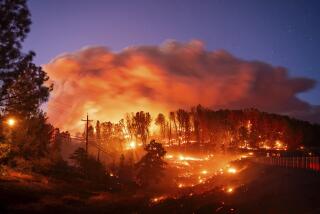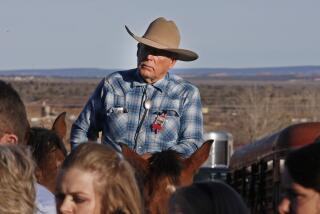How Oregon ranchers unwittingly sparked an armed standoff
Reporting from BURNS, Ore. — Those who know 73-year-old Dwight Hammond Jr. and his son, Steven, will tell you that the hot-tempered ranchers can sometimes be their own worst enemies.
But when the men were sentenced to additional prison time for setting two fires that spread to federal lands, many in this remote and rugged corner of eastern Oregon saw it as the federal government wielding too much power.
The ranchers have now become the unwitting inspiration for a self-proclaimed militia that has seized parts of a national wildlife refuge near here, declaring they will stand there until citizens like the Hammonds can manage their own land and die outside of prison.
It’s an honor that sits uneasily with the Hammond family and a number of their neighbors, who have sought to distance themselves from the armed takeover. Signs have gone up around town: “Bundy militia go home” and “No Bundy caliphate,” references to Ryan and Ammon Bundy, the brothers from Utah and Idaho who appear to be leading the band of protesters at the Malheur National Wildlife Refuge.
See more of our top stories on Facebook >>
As ordered by a federal judge, the Hammonds pulled up to the Terminal Island federal correctional facility in San Pedro on Monday in a sport utility vehicle and were escorted inside to complete their five-year sentences for arson. Karyn Gallen, a niece of Dwight Hammond who was on hand for the surrender, said the family appreciated the showing of support in Oregon. On the other hand, she said, “it has always been a request of the family that things be peaceful.”
The men’s repeated run-ins with the law have made them a potent rallying symbol in a generations-old struggle between local landowners and federal authorities over how to manage the once-wild Western range.
In economically struggling Harney County, about three-quarters of the land is publicly owned. Ranchers like the Hammonds, whose 10,000-acre spread is checkerboarded with land belonging to the U.S. Bureau of Land Management, depend on grazing leases from the federal government. But they face pressure from environmentalists who argue that livestock grazing and other extractive industries imperil wildlife habitats.
Friends and supporters of the Hammonds, who hail from a long line of Oregon ranchers, argue that their attempts to buck federal authorities are the product of a deep commitment to the community in which they live and the land that sustains it.
The Hammonds say they set the two fires in 2001 and 2006 to ward off invasive plant species and protect their property from a wildfire.
Federal prosecutors agreed that Steven Hammond, 46, started the 2006 fire as a defensive measure to prevent a blaze caused by a lightning storm from destroying the winter feed for the family’s cattle. But they argued that his actions violated a burn ban that had been in effect and endangered firefighters who were battling the wildfire.
Steven Hammond insisted he called an emergency dispatcher before setting the 2001 fire to make sure there was no burn ban in effect that day. But prosecutors said the call wasn’t made until two hours after the fire was set. They contended this fire, which spread to nearly 140 acres of government land, was set to cover up evidence of an illegal deer hunt.
It was not the first time that the Hammonds tangled with federal authorities about setting fires too close to public land. The original indictment listed several other alleged incidents dating to 1982, and said in some cases the Hammonds had obstructed efforts to fight the fires.
After a two-week trial in 2012, the two men served their time — three months for Dwight and a year for Steven — and family members said they assumed that would be the end of the matter.
Instead, the government appealed the sentences, arguing that they did not meet the legally required minimum of five years. U.S. District Judge Michael Hogan had ruled at their original sentencing that such a term would constitute cruel and unusual punishment and was therefore unconstitutional.
“It would be a sentence which would shock the conscience,” Hogan said.
But a federal appeals court agreed with the government and the men were resentenced to five years. Their last hope is an appeal for clemency from President Obama.
Gallen said the circumstances now facing her family were “unfathomable.”
“We are talking about 140 acres with no lives lost,” she said.
Because of the criminal convictions, the Bureau of Land Management did not renew the family’s grazing permits last year, and family members say it will be difficult to keep the ranch going.
What has also riled friends and supporters is that the ranchers were prosecuted under a 1996 law intended to punish domestic terrorists.
Sam Glerup, who owns a tow-truck business in Burns, acknowledged that the Hammonds are “no golden boys,” but said “they’re no terrorists,” either.
“The older one [Dwight], he’ll be dead before he ever sees the outside of a prison,” Glerup said.
In an open letter to the citizens of Harney County, Acting U.S. Attorney Billy J. Williams said federal prosecutors never accused the Hammonds of being terrorists.
“The evidence at trial convinced the jury beyond a reasonable doubt that the Hammonds were guilty of the federal crime of arson, that is, maliciously damaging United States property by fire,” he said. “The jury was neither asked if the Hammonds were terrorists, nor were defendants ever charged with or accused of terrorism. Suggesting otherwise is simply flat-out wrong.”
Anti-government activists rolled into town over the weekend to show support for the aging rancher and his son.
“We’re trying to accomplish the task of restoring rights to the people who have lost them or surrendered them,” Ryan Bundy told The Times on Monday.
Environmentalists, however, argue that what the protesters consider tyrannical treatment by the government is in fact a generous welfare program.
“There is enormous subsidization of public lands livestock grazing,” the Western Watersheds Project said in a statement Monday. “While the going rate for grazing a cow and a calf on private land for a month in Oregon is $17, the equivalent fee on federal public lands is only $1.69 ... hardly a sign that the federal agencies are trying to put ranchers out of business.”
The Malheur wildlife refuge, one of the country’s premier bird sanctuaries, is actually open to livestock grazing, according to the group.
“Thousands of Americans visit the refuge each year to enjoy the unique species that frequent the Pacific flyway, pouring over $1.9 million into the local economy annually,” it said. “When Ammon Bundy promotes his agenda of using the resource, he’s overlooking the many Americans who ‘use the resource’ to enjoy quiet recreation like bird-watching.”
Zavis reported from Los Angeles, Duara from Burns and Winton from San Pedro.
ALSO
A month after attack, employees return to Inland Regional Center in San Bernardino
Rams, Chargers and Raiders submit relocation applications to NFL; now for the hard part
Like old times, Bill Clinton joins the campaign trail in New Hampshire
More to Read
Sign up for Essential California
The most important California stories and recommendations in your inbox every morning.
You may occasionally receive promotional content from the Los Angeles Times.













